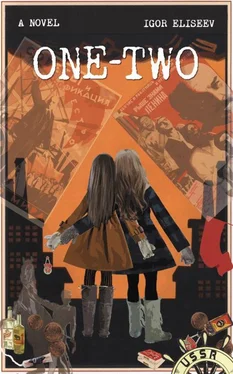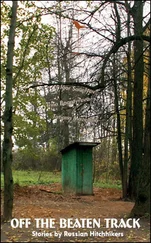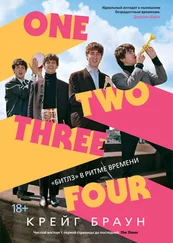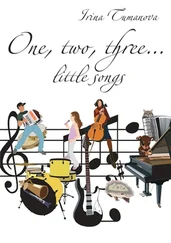“We are far enough away,” you said quietly as if afraid that you might be heard. “We need to take a rest. Let’s get some sleep – in turns: first you, then me. It’s safer that way.”
We spent our first restless night under an old wide-branching oak. You laid your head on my shoulder and fell asleep right away… and woke up in the morning feeling refreshed, happy and full of energy. It started drizzling, but the leaves covered us from moisture and we didn’t get too wet.
“It seemed as if I fell into a deep well,” you tried to explain, scratching your head. “Come on, let’s go.”
Having wrapped the humid blanket around ourselves, we stepped back out onto the footpath and moved on. Of course, I didn’t know where the road went; as always, you had a plan which you, however, didn’t share with me. It was getting more and more difficult to go on: the rain had washed away the footpath, mud squelched under our feet and seemed to be about to swamp us; the blanket got wet and heavy. Suddenly it came into our minds that we had a couple of chunks of gray bread from the dining room in our pockets, so we stopped under a tree and hastily ate the supplies that were stuck together from the moisture. The rain began to stop. Soon we came across a local village, probably the one that served as a source of bevy, cigarettes and inspiration for our “colleagues” from the foster home.
“Let’s go in and ask for some food or milk,” I suggested.
“We can’t, they may recognize us. Look at us! Ridiculous and far too noticeable. We just don’t blend into the village crowd.”
Disappointed, I shrugged my shoulders like an anti-Atlas, and we trudged on further. Unexpectedly, as if from under the earth, in the middle of a footpath, there appeared an old woman. She stood still, leaning on a stick; her lips were moving silently.
“What’s wrong with her? Is she blind or mad?” you said almost indignantly.
“She’s definitely not deaf,” I answered in a whisper. “Let’s go our way.”
Carefully, on tiptoe, we made our way on. Glancing at the woman, I noticed sadness in her heavily aged eyes which were fixed on the distance. Having walked on a little, we saw an old house whose windows evoked shrill melancholy and hopelessness. Here and there the fence beveled, the roof moved apart, a broken lock hung on the open wicket gate. It was getting dark. The rain that had stopped some time ago started once more with a vengeance.
“Let’s knock and say we are lost,” you said.
“Whatever you do, I’ll do too,” I agreed immediately. “I’m absolutely shattered.”
Having knocked on the door and on the windows, we stood motionless under the canopy – hunched, tired, trying to cover ourselves from the rain – with no success at all. There was only deaf silence in reply. We heard hens cackling somewhere, and noticed a sad cat lying under the bench. Then, emboldened by the absence of the owners, we went up to a shed and walked inside. The hay was crisp under our feet; we saw a pitchfork, empty baskets, scoops and a cartwheel hanging on the walls. Our feet were humming with fatigue, our backs ached.
“It’s late; there’s no one in the house. Let’s wait here till morning,” you suggested.
We took off the wet blanket and hung it on a nail to dry, near a pitchfork, then we made up a sort of bed in the hay, took off our shoes and lay down, hugging each other. You shivered with cold and I suffered from the stuffy air; my feet hurt strangely as if I were still walking on a twisty road. For a long time our hunger and fatigue kept us awake. We had to get up and then lie face down. It helped, and we finally managed to fall asleep.
I woke up with the dreadful feeling that someone else was in the shed. Having opened my eyes, I saw the old woman we had met in the wood. She was sitting silently in front of us, deep in thought, and looking at us almost without blinking. I woke you up at once.
“We’re caught.”
Though I tried to speak quietly, every word was audible. For a minute we all looked at each other: we were confused, and she was pensive. It was paralyzing and made me feel desperate and hopeless.
“Don’t be afraid of me. Are you hungry?” she asked kindly, but that didn’t stop her scaring me. “Come into the house.”
“We are not afraid at all,” you announced boldly.
“Well, then, come with me.” The old woman slowly rose from the upside-down bucket on which she had been sitting and went towards the house.
“I’m not going to bite you, sweeties,” she added in a tone which was meant to encourage us. “Come, come, the meal is getting cold.”
“We’re coming,” you answered resolutely.
“Do you think she noticed our problem ?” I mumbled while we were trudging through the yard.
“It doesn’t matter anymore. We’ll have our meal, then ask the way to the nearest station and leave.”
The landlady was waiting for us at the door of the old house and invited us in with a gesture. We went in and saw a long corridor with several doors, three on the left and one on the right; there was a bed with curtains hanging over it at the end of the corridor. The old woman opened the first door on the left, and we entered a large kitchen with a big Russian stove and a stove bench, a table with a colorful cloth and a small cauldron on it with tasty smelling food and three empty plates. We sat down on two chairs with warped backs tightly tied together with a rope – obviously, the landlady had taken care of everything beforehand – and she put freshly-baked bread, just out of the stove, on the table. Here and there we could see household items; everything seemed so homely and familiar, as if this was home after long wandering.
“You look very hungry; you’re so thin. Help yourselves.”
We instinctively muffled ourselves up in the blanket which was still wet because we believed it protected us from unwanted questions. Bread was sliced and plates filled up with hot soup. The landlady sat down opposite us and gave us spoons. Without saying a word, we dug into our food, not even tasting it; after two helpings we were intoxicated with satiety.
Despite her advanced age, the old lady resembled Adoter in some ways. The likeness was so striking, as if she were her mother, but her eyes were absolutely different, sad and thoughtful, and simplicity of character was in her movements and in her voice. Having finished her own meal, she got up, putting her hand on her sore lower back, and told us to follow her. Going back into the corridor, we entered the third door on the left and saw a tiny bedroom with a disproportionately large bed occupying two thirds of the room.
“Here is your bed. Perhaps it’s not very comfortable in the shed.”
She said goodnight and left. I couldn’t make heads or tails of what was happening. Could reality be so chaste and beautiful? This bed with two pillows instead of one, a warm, soft blanket – isn’t it a dream? You quickly fell asleep but I restlessly listened to the surrounding sounds, and couldn’t decide if I should be afraid or happy. Eventually, fatigue overcame fear and I fell into a deep sleep.
We were woken by a rooster’s crow. The sun was shining brightly behind the window and nothing reminded us of yesterday’s rain. Having got out of bed, we looked for our blanket for a long while, feeling physiologically dependent on it.
“That granny must have filched it,” you said with irritation. “I wonder what she is going to do with it.”
“Somehow I doubt that,” I mumbled to myself. “What shall we do?”
“She took ours, and we will take hers,” you responded quite belligerently.
“Wait!” I protested. The mere thought of another theft drove me crazy. I couldn’t contemplate stealing a blanket from such a kind old woman. “Maybe it’s not worth it? No blanket – no problems. She will know it is us.”
Читать дальше












